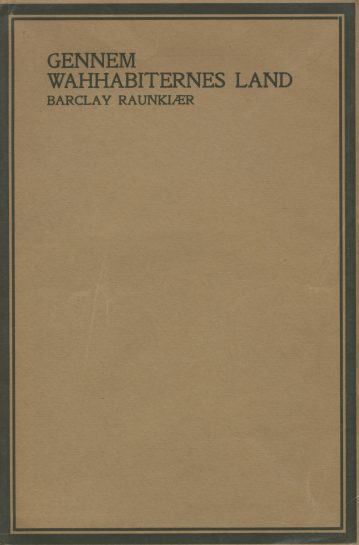Gennem Wahhabiternes Land Paa Kamelryg 1912. Beretning om den Af det kongelige Danske geografiske selskab planlagte og bekostede forskningsrejse I ost-og Centraarabien 1912.
Raunkiaer, Barclay.
Synopsis
At the age of twenty three the Dutch Barclay Raunkiaer (1889-1915) set out to explore eastern Arabia in 1912 on behalf on the Royal Dutch Geographical Society. The Danes had a history of exploration in the Arabian Peninsula going back to Carsten Niebuhr in the 18th century. In 1911 the Royal Danish Geographical Society decided to revive that tradition by mounting a new expedition. One of the members was a young Danish student, Barclay Raunkiær, whose father, the botanist Christen Raunkiær, gives his name to a system of plant categorisation still in use today.
The Society duly informed the British Government of their intentions. However, the British viewed the expedition as an unwelcome intrusion into their imperial sphere of influence, and decided that it should be prevented. The British claimed that as they could not guarantee the safety of their own officers and travellers in the region, they could not offer any assistance or protection to the Danes either.
As a result, the Society abandoned the scheme, despite the fact that money had been raised and plans were well advanced. Nevertheless, Raunkiær decided to make the journey himself, he arrived at Kuwait in January 1912 as a guest to the ruler Sheikh Mubarak al-Sabah. He later travelled in January of the same year to Riyadh and was received and helped by Imam Abdul Rahman al-Saud, father of King Abdul Aziz. The journey ended in Hofuf, at the time still garrisoned by the Ottoman Turks. Raunkiaer gives a vivid picture of Baghdad, Dahna, Zilfi, Buraida, al-Safa, Hofuf Sadous, Riyadh etc. On his way back he passed by Bahrain.
References: Facey, Kuwait by the first photographers, pp. 50-51; “Mr. Raunkiaer’s expedition in east-central Arabia”, The geographical journal XL (1912), pp. 331-332; “Danish expedition to Arabia”, The geographical journal XLIV (1914), pp. 85-86; not in Howgego.






